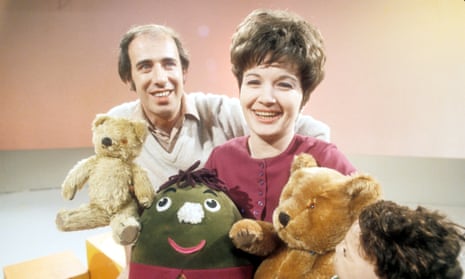The actor Rick Jones, who has died aged 84 of cancer, found fame in the 1960s and 70s as a children’s television presenter - notably on Play School and Fingerbobs – when his musical talents were discovered by the BBC. Later, he went on to front the country rock band Meal Ticket.
In 1964, he sang and strummed the guitar at the Royal Court theatre, London, in Spoon River, a stage show based on Edgar Lee Masters’ poems about the people living in a small-town Illinois community. Donald Sutherland and Betsy Blair starred, and although Jones was at first miffed at not being able to show off his acting and verse-reading skills he grew to love singing American folk songs to packed houses.
One evening, the producer Joy Whitby, who was planning a new television programme for under-fives, Play School, went backstage to ask him to join the show. Although he regarded the BBC as being “a notoriously stingy payer”, he saw the opportunity of financial stability for his family, especially with episodes being repeated daily, doubling his fee.
Jones spent a decade (1964-73) as a presenter of the weekday-morning show remembered for its “house” windows opening up the world outside to its young viewers. He sang, told stories and dressed up for 447 episodes – with only Carol Chell, Brian Cant, Julie Stevens, Chloe Ashcroft, Johnny Ball and Sarah Long appearing in more.
He made a huge impression in his own right on that audience as presenter of the 1972 series Fingerbobs. Broadcast in the lunchtime Watch with Mother slot, Fingerbobs was devised by Michael and Joanne Cole, and featured the adventures of Fingermouse and his friends, including Scampi the fish, Gulliver the seagull and Flash the tortoise.
In the guise of “Yoffy”, Jones used his gloved hands to create those animals and others as paper finger puppets, also performing songs about them – and his own character: “Yoffy lifts a finger and a mouse is there/Puts his hands together and a seagull takes the air/Yoffy lifts a finger and a scampi darts about/Yoffy bends another and a tortoise head peeps out.”
Jones lost weight while filming the shows, which ran to only 13 episodes but were repeated for another 12 years. “It was such hard work scooting around under tables with one’s fingers up little animals’ bums,” he told Garry Vaux, author of Legends of Kids TV (2009). “We finally engineered a system of slings on runners so I could whizz about manically down there trying desperately to remember which character to stick up which entrance on what cue.”
He was fired by the BBC when an overzealous fan, perhaps influenced by his hippy look – straggling locks, beard and balding pate – sent him two cannabis spliffs in the post at the corporation’s address, although Jones did suggest that drugs were part of the culture at the time, adding that the BBC studios were also then a hotbed of illicit sex.
Then, he concentrated on music with the country rock band Meal Ticket. He played keyboards, alternated as lead vocalist with Willy Finlayson and, with Dave Pierce, wrote many of the group’s songs as they played on the London pub circuit and released the albums Code of the Road (1977), Three Times a Day (1977) and Take Away (1978).
The BBC commissioned Jones and Pierce to write You’d Better Believe It, Babe, which Meal Ticket performed as the theme to the award-winning time-travel fantasy The Flipside of Dominick Hide (1980) and its sequel, Another Flip for Dominick (1982).
Jones was born to British parents, Agnes (nee Hannon) and Frederick Jones, in London, Ontario; his parents had moved to Canada and his father served in the Canadian army. On leaving London Central high school, he started his working life as a forester and nickel miner.
Moving to Britain in 1957, Jones trained at the Webber Douglas Academy of Dramatic Art, in London, where Terence Stamp was a friend and contemporary, then acted for three years with the repertory company at the Library theatre, Manchester (1959-62). During a break in 1961, he toured the US with Theatre Outlook in productions including Coriolanus and, later, he made his London West End debut in Fiorello (Piccadilly theatre, 1962).
One of his earliest television appearances came as Mercutio in an ITV adaptation of Romeo and Juliet starring Jane Asher. As resident folk singer at the Pickwick Club in London, which was popular with celebrities, he once performed in front of the Beatles.
On TV, Jones also sang in Jackanory during 1966 and appeared singing and presenting in Whoosh! (1968) and editions of Play Away between 1972 and 1974, as well as acting in episodes of The Saint (1967) and Dr Finlay’s Casebook (1969).
His voice work included dubbing characters in the French children’s series Belle and Sebastian (1967-68), about a boy and his dog, as well as foreign porn films, and he wrote the English theme song for another French-produced programme, Aeronauts (1967-70).
Jones moved to the US in 1981, when his musical comedy Captain Crash vs the Zzorg Women Chapters 5 and 6 – written with Pierce and others – was staged at Richmond’s, a theatre in Los Angeles. Later, with Roger Penycate, he developed the musical Laughing Daughter, based on the songs of Meal Ticket and performed at the Black Box theatre, in Silver Spring, Maryland, in 2009.
His 1960 marriage to Min (Marina) Ayles ended in divorce. He married Valerie Neale in 1986 and they recorded an album, Life Drawing, together in 2008. He is survived by Valerie and the daughters of his first marriage, Leaflyn and Chrysta.

Comments (…)
Sign in or create your Guardian account to join the discussion